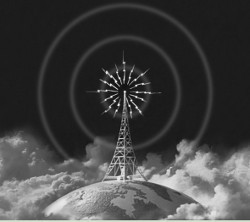National Public Radio (NPR) is already organized in a quasi-civilitic way. The model is based upon giving service and depending, in part, on the supportive behavior of people who listen to the programming.

Credit:
deviever
In its most basic form, NPR broadcasts are produced as a free contribution to the public benefit. This includes news, art, music, and specials. Anyone in the broadcast area is welcome to listen to the programming without any need to pay. Of course, because there is no fully civilitic framework, the radio stations have fiscal obligations and need financial support in order to survive. To meet those needs, they need some listeners to contribute money for the programming, but there is no binding requirement to do so. As a result, NPR programming certainly is a gift to the listening audience.
On the other side of the radio signal, listeners of NPR are encouraged to contribute money to help support the programming they like. While many listeners might never send a payment, there are many others who do. Those who contribute have some influence over the programming choices and thereby encourage specific behavior by NPR. Ultimately, those contributions are gifts made back to the radio stations as a way of saying “I like what you are doing, please keep doing it.”
Civilitics works in much the same way as NPR except that it works at a global human scale. Rather than considering the preferences of radio broadcasts, it is the actions of people which are considered for public approval. Rather than payments being made to a radio station, people (other than the original beneficiaries) act as the providers of goods and services to one another. A civilitic framework allows people to know how much contribution others are making and reward them accordingly. High contributors are more likely to be rewarded and will be more highly rewarded while low contributors will be less so.
